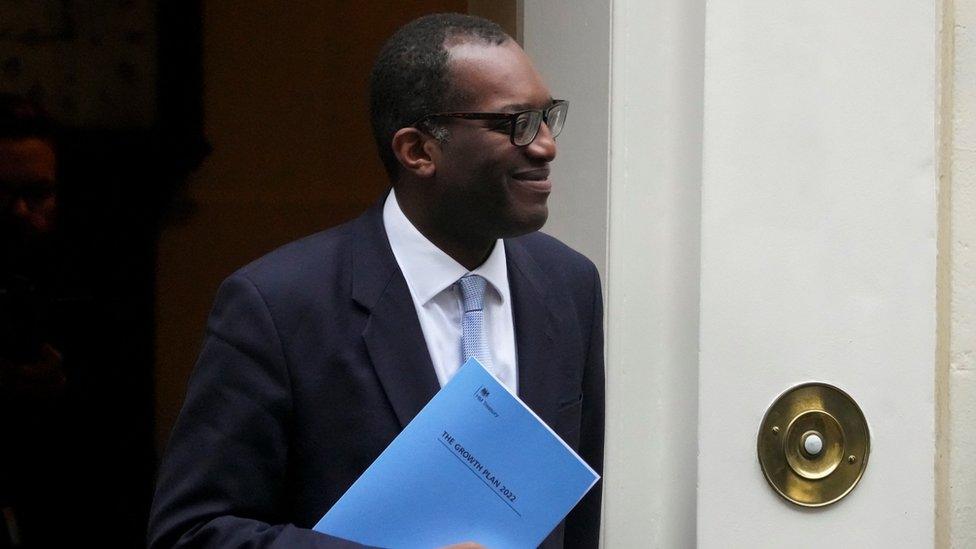Mini-budget: What does it mean for Wales?
- Published

Kwasi Kwarteng promised 'a new approach for a new era'
Chancellor Kwasi Kwarteng has delivered a mini-budget full of tax cuts in a bid to grow the economy.
His announcement included tighter rules on universal credit, cancelling a rise on alcohol duty and scrapping the highest rate of income tax.
The UK government said more than a million people in Wales will benefit from an earlier than planned reduction in the basic rate of income tax.
"We promised a new approach for a new era," Mr Kwarteng said.
Mr Kwarteng pledged to "turn the vicious cycle of stagnation into a virtuous cycle of growth".
But the Labour First Minister of Wales Mark Drakeford said the announcement "embeds unfairness," giving "tax cuts to the rich" and "bonuses to bankers" instead of "meaningful support to those who need it".
One Welsh charity called cuts for the rich while the poorest struggle "grotesque", while a Tory MP described the budget as "great news for stockbrokers" and "underwhelming".
Measures included reductions to stamp duty in England. The UK government said the Welsh government would get an additional £70m as a result.
Income tax
The chancellor announced that the basic rate of income tax will be cut to 19% from April, one year earlier than planned.
Some 1,290,000 people in Wales are on the basic rate of tax. The UK government said the measure would be worth an average of £170 per year.
Also from April the additional rate of tax, paid at 45% on incomes of over £150,000, will be scrapped.
Some 9,000 people pay that in Wales.
Welsh ministers can vary rates in Wales, but have never done so. Welsh government Finance Minister Rebecca Evans confirmed the UK government decision to scrap the additional rate means Welsh ministers cannot set their own for Wales.
Tighter rules on universal credit
Universal credit claimants working fewer than 15 hours a week face having benefits reduced if they do not meet a work coach regularly, and take "active steps" to increase their earnings.
In January 2022 a total of 232,739 households were on universal credit in Wales. Citizens Advice Cymru said 44,321 people are in the group who would be affected by the new sanction.
Jobseekers over the age of 50 will be given more time with jobcentre work coaches to help them return to the job market, the UK government said.
National Insurance
The Boris Johnson-era rise in National Insurance, where workers and employers pay an extra 1.25p in the pound, will be reversed from 9 November.
Kwasi Kwarteng said planned increases in NHS and social care funding in England will continue.
UK government figures suggested the decision will mean two million people in Wales get a National Insurance cut worth £235 a year.
Stamp duty in England
In England and Northern Ireland stamp duty will be cut, so nothing will be paid on house purchases up to £250,000, rising from £125,000.
First-time buyers will pay no stamp duty on purchases up to £425,000.
Wales has its own equivalent system, called land transaction tax, where the residential threshold is £180,000. There is no first-time buyer rate.
The UK government said Welsh ministers will get £70m following the changes in England and Northern Ireland.
It would be up to the Welsh Labour government if it wants to follow the changes - the Welsh Conservatives in the Senedd called for ministers to also make cuts.
"Labour ministers need to take the same approach by scrapping land transaction tax for first time buyers here in Wales and properties up to £250,000," Tory Shadow Minister for Finance Peter Fox said.
Plaid Cymru's Ben Lake said the Welsh government should avoid a universal cut to Land Transaction Tax, "because as we've seen in the past, it just serves to fuel house prices".
But he said he would like to see ways to "perhaps support first-time buyers".
Other plans
A planned rise to corporation tax on companies has been scrapped.
Plans to increase alcohol duty on beer, cider, wine and spirits have been cancelled.
The chancellor said he would "look to work" with the Welsh and Scottish governments on setting up "investment zones".
Announced for England, the UK government said the zones will offer "targeted and time limited tax cuts for business and liberalised planning rules to release more land for housing and commercial development".
Planning policy in Wales is controlled by the Welsh government in Cardiff.
What is the reaction?
UK government Welsh Secretary Sir Robert Buckland said: "Today's bold measures put economic growth at the heart of our plans for Wales and the UK.
"The UK government has already committed to protect Welsh households and businesses from rising prices through the Energy Bill Relief Scheme. But a healthy, growing economy is the best long-term solution to the enormous financial pressures facing the entire country."
But there was concern from the Welsh government, whose Finance Minister Rebecca Evans said it was "deeply worrying", with "misplaced priorities leading to a regressive statement that will embed unfairness across the United Kingdom".
"Instead of delivering meaningful, targeted support to those who need help the most, the chancellor is prioritising funding for tax cuts for the rich, unlimited bonuses for bankers, and protecting the profits of big energy companies."
A Welsh Conservative MP told BBC Wales that the mini-budget was "pretty underwhelming"."Great news for stockbrokers, but not necessarily great news for working families," they said.The MP added that the UK government is "going to need a broader message in the months ahead" and it must not "lose sight of the levelling up agenda".Luke Young of Citizens Advice Cymru, which gives advice to people on benefits, said: "We need to be plain here: a tax cut for the richest while the least well off struggle to make ends meet is grotesque".
"Energy prices are locked in higher than they ever have been. Emergency food and fuel needs are at record levels.
"The people we support have little, and today, gain little."
Plaid Cymru Treasury spokesperson Ben Lake said: "The chancellor's statement today was about supporting those on the highest incomes.
"Households and businesses across Wales are facing a grim winter of unaffordable bills and soaring inflation, and the government's response is to engage in fantasy, trickle-down economics to please the super-rich."

BAFTA CYMRU NOMINEES: Celebrate the best of the BBC

Related topics
- Published17 October 2022

- Published23 September 2022

- Published23 September 2022
